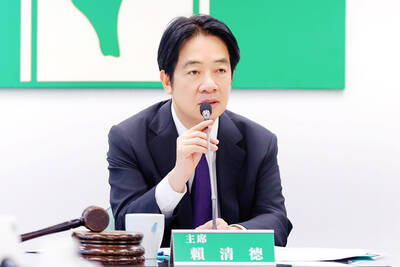The Chinese Nationalist Party (KMT) will hold another Central Standing Committee (CSC) election and discuss its voting system after 28 members had offered their resignations by yesterday, forcing another vote.
The number of CSC members who had resigned or were willing to resign increased from 22 on Friday amid criticism that the election for seats on the party’s decision-making body was marred by rampant bribery.
KMT spokesman Lee Chien-jung (李建榮) confirmed the number yesterday afternoon, saying that four more CSC members, namely Lai Diao-tsan (賴調燦), KMT Central Committee member Hua Jen (華真), Liao Wan-lung (廖萬隆), a Taiwanese businessman based in China and vice principal of Da Der Vocational School Hsieh Kun-hung (謝坤宏), offered to resign yesterday. Former KMT legislator Lee Chuan-chiao (李全教) and KMT Legislator Lin Tsang-min (林滄敏) also said they were willing to resign, Lee said.
Only two CSC members, KMT Taipei City Councilor Li Keng Kuei-fang (厲耿桂芳) and Taipei County Council Speaker Chen Hsin-ching (陳幸進), stayed firm on keeping their seats.
Lee Chien-jung said the party would have to hold an election because almost all its members had resigned.
“The CSC election was held in a legitimate and fair manner, and so there will be no ‘re-election.’ What we will hold is a ‘by-election’ to fill up the seats left by the members who resigned,” he said.
The KMT on Tuesday revoked the elected status of Yang Chi-hsiung (楊吉雄) and Chiang Da-lung (江達隆) for giving gifts to party delegates.
KMT regulations state that the CSC should meet with at least half its members present, including the chairman, six vice chairmen, five designated members and 32 elected members.
The party can hold an election if 23 CSC members or more resign.
Lee said the party would also examine the district voting system for CSC elections during a provisional CSC meeting tomorrow night. The new election would adopt the new system if any changes were made.
He reiterated KMT Chairman Ma Ying-jeou’s (馬英九) support for CSC members who had offered their resignations to push for clean elections, but declined to confirm that Ma was behind the wave of resignations.
Also See: FEATURE: More is needed to end KMT’s bribery culture

President William Lai (賴清德) yesterday criticized the nuclear energy referendum scheduled for Saturday next week, saying that holding the plebiscite before the government can conduct safety evaluations is a denial of the public’s right to make informed decisions. Lai, who is also the chairman of the Democratic Progressive Party (DPP), made the comments at the party’s Central Standing Committee meeting at its headquarters in Taipei. ‘NO’ “I will go to the ballot box on Saturday next week to cast a ‘no’ vote, as we all should do,” he said as he called on the public to reject the proposition to reactivate the decommissioned

In his National Day Rally speech on Sunday, Singaporean Prime Minister Lawrence Wong (黃循財) quoted the Taiwanese song One Small Umbrella (一支小雨傘) to describe his nation’s situation. Wong’s use of such a song shows Singapore’s familiarity with Taiwan’s culture and is a perfect reflection of exchanges between the two nations, Representative to Singapore Tung Chen-yuan (童振源) said yesterday in a post on Facebook. Wong quoted the song, saying: “As the rain gets heavier, I will take care of you, and you,” in Mandarin, using it as a metaphor for Singaporeans coming together to face challenges. Other Singaporean politicians have also used Taiwanese songs

US President Donald Trump on Friday said that Chinese President Xi Jinping (習近平) told him China would not invade Taiwan while Trump is in office. Trump made the remarks in an interview with Fox News, ahead of talks with Russian President Vladimir Putin over Moscow’s invasion of Ukraine. “I will tell you, you know, you have a very similar thing with President Xi of China and Taiwan, but I don’t believe there’s any way it’s going to happen as long as I’m here. We’ll see,” Trump said during an interview on Fox News’ Special Report. “He told me: ‘I will never do

CLAMPING DOWN: At the preliminary stage on Jan. 1 next year, only core personnel of the military, the civil service and public schools would be subject to inspections Regular checks are to be conducted from next year to clamp down on military personnel, civil servants and public-school teachers with Chinese citizenship or Chinese household registration, the Mainland Affairs Council (MAC) said yesterday. Article 9-1 of the Act Governing Relations Between the People of the Taiwan Area and the Mainland Area (臺灣地區與大陸地區人民關係條例) stipulates that Taiwanese who obtain Chinese household registration or a Chinese passport would be deprived of their Taiwanese citizenship and lose their right to work in the military, public service or public schools, it said. To identify and prevent the illegal employment of holders of Chinese ID cards or